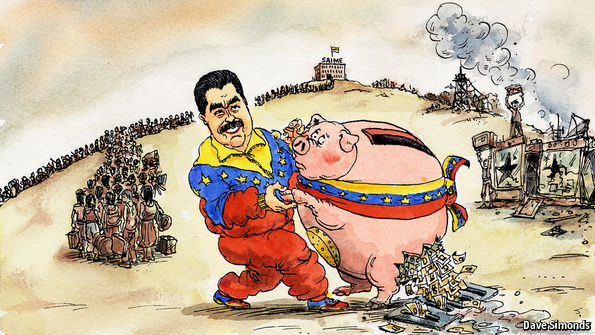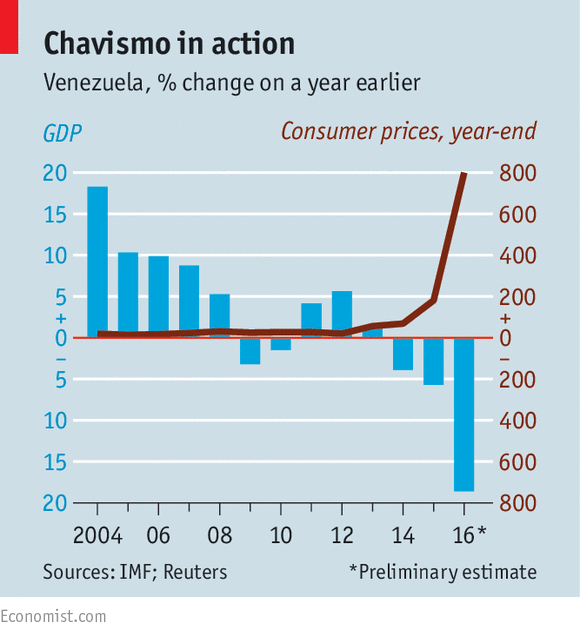Is This How Democracy Ends?
This malicious drivel comes from a
Marxist
patter merchant, one called
David Runciman;
he hates
Donald Trump. Is Runciman stupid enough to believe this
rubbish or does he
think we are? The worrying aspect is that the twerp is teaching England's best
and brightest at Cambridge.
As Venezuela
Crumbles The Regime Digs In As desperation rises, so does the intransigence of Venezuela’s
“Bolivarian” regime, whose policies have ruined the economy and
sabotaged democracy. The economy shrank by 18.6% last year,
according to an estimate by the central bank, leaked this month to
Reuters, a news agency (see chart). Inflation was 800%. Venezuela’s salsa-loving president, Nicolás Maduro, has
responded to bad news with bluster (he blames foreign and domestic
“mafias”) and denial. Soon after the leak of the central bank’s
estimates he fired its president, Nelson Merentes. Mr Maduro may
have held him responsible for the leak. Or he may have punished him
for a botched attempt by the government in December to introduce new
banknotes. A currency swap makes sense. The 100-bolívar note, long the
highest denomination, is worth less than three cents on the black
market. Shopkeepers sometimes weigh them instead of counting them.
They are to be replaced with a new set of notes worth up to 20,000
bolívares. The government’s stated reason for making the switch—to punish
hoarders—made no sense. Who would store up the world’s fastest
depreciating currency? Its execution was tragicomic. After
Venezuelans had queued for days to return to banks bills about to
lose their value (sometimes in exchange for notes with even smaller
denominations) the replacements failed to show up. Chaos ensued as
Venezuelans returned to the banks to withdraw 100-bolívar notes.
Their demonetisation is now scheduled for February 20th. The change at the top of the central bank does not portend better
policies. Ricardo Sanguino, the new president, is a Marxist former
university professor who has spent 15 years as a loyal
parliamentarian from the ruling socialist party. He will have less
influence than Ramón Lobo, the newly appointed economy tsar, an
economist with little high-level experience. They are unlikely to deal with the causes of Venezuela’s penury.
These include controls on foreign exchange and prices of basic
goods, which lead to shortages and corruption; unrestrained public
spending; the expropriation of private industry; and the plundering
of PDVSA, the state oil company, which provides nearly all of
Venezuela’s export revenues. Ordinary Venezuelans have lost faith in the regime, if not in
chavismo, the pro-poor populism espoused by
the late Hugo Chávez, who ruled from 1999 until 2013. Mr Maduro, his
successor, has an approval rating of 24%. In December 2015
Venezuelans elected a parliament dominated by the opposition. Mr Maduro’s response has been to cling on to power more tightly.
The electoral commission, controlled by the regime, has blocked a
referendum to recall him from office. The supreme court, manned by
government loyalists, has blocked almost everything the national
assembly has tried to do. On January 15th Mr Maduro delivered his
annual state-of-the-nation address not to the legislature, as the
constitution requires, but before the court. The regime says it wants dialogue with the opposition but has
done little to enable it. Talks mediated by the Vatican and by
Unasur, a regional body, broke down in December after the opposition
accused the government of reneging on promises, including to release
political prisoners and restore powers to parliament. Mr Maduro’s recent appointment of a new vice-president suggests
that the regime is moving further away from dialogue and reform. He
replaced Aristóbulo Istúriz, a moderate by
chavista standards, with Tareck El Aissami, a hardliner. One of
Mr El Aissami’s first acts was to announce the arrest of Gilber
Caro, an opposition politician. He had an assault rifle and
explosives in his car, the government claims; his party says the
weapons were planted. Mr Maduro appears to be making two bets. The first is on disarray
among the opposition. Divisions within the Democratic Unity
alliance, a grouping of many parties, are widening as their efforts
to defeat chavismo falter. It lacks a leader
who can appeal to poor Venezuelans who feel betrayed by the regime’s
empty promises. Mr Maduro’s second hope is that oil prices will bounce back. They
have already recovered from $21 a barrel in 2016 to $45. But PDVSA
has been so badly managed and starved of investment that it will
struggle to reap the benefits. Output fell by 10% last year and no
rise is likely in 2017. Venezuela’s foreign reserves have dwindled
to less than $11bn; its easy-to-sell assets are about a fifth of
that. Mr Maduro vows that 2017 will be the “first year of the new
history of the Venezuelan economy”. That will not shorten the
passport queues.
QUOTE
Nicolás Maduro draws the
wrong conclusions from the economic crisis

EVERY weekday morning, a queue of several dozen forlorn people
forms outside the dingy headquarters of SAIME, Venezuela’s passport
agency. As shortages and violence have made life in the country less
bearable, more people are applying for passports so they can go
somewhere else. Most will be turned away. The government ran out of
plastic for laminating new passports in September. “I’ve just been
told I might need to wait eight months!” says Martín, a frustrated
applicant. A $250 bribe would shorten the wait.

These are provisional figures, subject to revision. They may
never be published (the central bank stopped reporting complete
economic data more than a year ago). The inflation estimate is close
to that of the IMF, which expects consumer prices to rise by 2,200%
this year. The Economist Intelligence Unit, a sister company of
The Economist, puts last year’s economic
contraction at 13.7%. That is still much sharper than the decline in
Greece’s output at the height of the euro crisis. In 2001 Venezuela
was the richest country in South America; it is now among the
poorest.
UNQUOTE
Marxism still has its adherents. Are they mad?